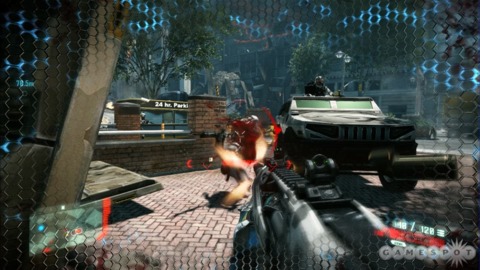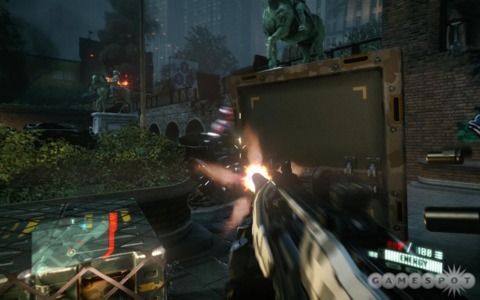Crysis 2: Final Thoughts
Crysis 2's development director speaks out on multi-platform development, the change of scenery, and building a better story for Crysis.

The lush jungles of the original Crysis gave way to the urban canyons of New York City in Crysis 2--one of many changes developer Crytek ushered in with the latest entry in the first-person shooter series known for its technical wizardry. We spoke with Jan Lechner, development director on Crysis 2, to get his thoughts about the game, fan reaction, and some of the decisions the development team made over the course of bringing Crysis 2 to life.
Sclash - Console Release Date Trailer Kingdom Come: Deliverance 2 - Official Cinematic Announcement Trailer Stellar Blade - BIBI ‘Eve’ Official Music Video Trailer | PS5 Apex Legends: Urban Assault Collection Event Trailer Total War: WARHAMMER III - Elspeth von Draken Gameplay Showcase Genshin Impact - "Arlecchino: Sleep in Peace" | Official Character Teaser Potionomics: Masterwork Edition - Official Announcement Trailer Snowbreak: Containment Zone - "Gradient of Souls" Version Trailer Harold Halibut GameSpot Video Review Nancy Drew: Mystery of the Seven Keys | World Premiere Official Trailer Modern Warfare III & Warzone - Official Cheech & Chong Bundle Gameplay Trailer SteamWorld Heist II – Official Reveal Gameplay Trailer
Please enter your date of birth to view this video
By clicking 'enter', you agree to GameSpot's
Terms of Use and Privacy Policy
GameSpot: What was the general feeling among the team when work began on Crysis 2? What did you feel that you needed to prove?
Jan Lechner: First of all, we were proud of what we had achieved with Crysis. Having worked on a game for three years and then witnessing how much people love it feels amazing. Nevertheless, we also knew that there were many areas we could do better and that there was still room for improvement. Crysis was perceived as a technical beast that could melt down the strongest PC hardware. Crysis was made to last long in the rapid progression of PC hardware. But the fact that many people felt they could not max it out on their rig led to negative feedback. At times it was perceived as bad optimization on our end, so this time we wanted to prove that we could do the same on consoles.
The story was probably the biggest aspect of the game we wanted to improve in Crysis 2. We realized that we created a strong universe that would offer plenty of opportunities to meet interesting characters and confront the player with intense situations. The nanosuit should become the real hero of the game and provide the entire fictional backstory for the player to understand where it's coming from. All this came a bit short in Crysis, and we wanted to prove to our fans and ourselves that we can do it better.
GS: What are the advantages of working on a game that essentially serves as a demonstration for your own engine? Are there any drawbacks?
JL: If your game is also promoting your own tech, it naturally pushes you to make the best use of it, develop it even further, and show all its features in its best light. Without CryEngine 3 we wouldn't have been able to achieve Crysis 2. With a highly iterative approach to development we managed not only to push technological boundaries, it also helped us to constantly improve both Crysis 2 and our tech.
GS: Can you talk a little bit about the transition from generally more open-world-style gameplay to the more focused approach for Crysis 2? Was there a specific goal in mind with that decision, or is it merely reflective of trends with first-person shooters?
JL: The decision about changing the game's setting was a very tough one. After the release of Crysis, we immediately started to think about Crysis 2 and whether we wanted to keep the original island and jungle setting or move to an entirely new setting. In the end, we felt we wanted to offer a new experience to our gamers, and that's why we chose NYC. The city that never sleeps felt like the perfect setting for the Crysis sequel. The whole story of Crysis was centered on the island and the government conspiracy, so everything was pretty limited in a local sense. Barely anybody from the rest of the world was affected by the catastrophe, but of course, when people left the island after the big bang at the end of the game, they started to spread rumors about it. So if you ask yourself what the next logical step might be, it was clear that everything would move to the big population centers of the world. This naturally led us to choose New York City.
GS: How do you perceive some of the negative reaction from PC players? Did you expect the vocal vehemence based on a perceived step backward in visuals and sandbox gameplay?
JL: Yes and no. We understand that many PC gamers were expecting yet another big step forward in visuals as we did with Crysis since the game set an incredibly high benchmark, especially in terms of graphics. From the beginning of Crysis 2 development on, it was our goal to exceed our own benchmark and deliver an even better gaming experience with Crysis 2--not only in terms of visuals, but overall experience. The change of the setting resulted in the fact that the gameplay is one of the biggest differences between Crysis and Crysis 2.
A city does not provide you with the open spaces of a jungle, but at the same time a city definitely offers a wide range of new experiences and offers many different areas that players can use as playgrounds. The destruction of the city allowed us to break the game space open, but we also could not overdo it and risk losing the feeling of New York. We added the vertical gameplay and combat approach that provides the player with many interesting and different gameplay layers. The players are not just confined to the ground and streets. They can jump between different floors or onto buses or trucks, drop down into craters and fissures in the streets, and leap from one building to the next. We didn't take a step back in sandbox gameplay; rather, we transformed it into something that we could apply to the setting of Crysis 2. The game combines the intensity of a linear FPS experience with the open sandbox gameplay and spaces Crysis is famous for.

GS: The ending comes as a true surprise. What does it mean for potential sequels? Did you know how you wanted to end the game from the outset, or did it come organically?
JL: The ending pretty much developed over time, but we had a rough idea of how we'd like to end it when we started. We wanted to show the larger scale of the alien invasion and how the events in New York fit into the bigger picture. In terms of what will happen next, we will have to wait and see.
Sclash - Console Release Date Trailer Kingdom Come: Deliverance 2 - Official Cinematic Announcement Trailer Stellar Blade - BIBI ‘Eve’ Official Music Video Trailer | PS5 Apex Legends: Urban Assault Collection Event Trailer Total War: WARHAMMER III - Elspeth von Draken Gameplay Showcase Genshin Impact - "Arlecchino: Sleep in Peace" | Official Character Teaser Potionomics: Masterwork Edition - Official Announcement Trailer Snowbreak: Containment Zone - "Gradient of Souls" Version Trailer Harold Halibut GameSpot Video Review Nancy Drew: Mystery of the Seven Keys | World Premiere Official Trailer Modern Warfare III & Warzone - Official Cheech & Chong Bundle Gameplay Trailer SteamWorld Heist II – Official Reveal Gameplay Trailer
Please enter your date of birth to view this video
By clicking 'enter', you agree to GameSpot's
Terms of Use and Privacy Policy
GS: There were some changes to suit functionality in Crysis 2, but the basic functions remained mostly the same. Did you ever consider adding other functions, like time manipulation or something similar?
JL: For sure--we had considered quite a few additions to the nanosuit, but we always wanted to keep it consistent from Crysis to Crysis 2. Since the suit is the core of the Crysis games, and the game experience in Crysis is heavily defined by the nanosuit and its abilities, it was important to carefully develop the suit further instead of changing it completely. Changing the suit drastically would have made Crysis 2 a different game. One of our main goals for Crysis 2 was to evolve the nanosuit to be more fluid, accessible, and ultimately powerful, letting players express themselves in a much better way than the first version of the nanosuit did. We also had to keep the fiction in mind. There are only three years between Crysis and Crysis 2, and we did not want to design completely new features for the suit that logically could not happen in such a short time frame.
GS: If you had made Crysis 2 just for the PC, technology aside, do you think you would have designed the game differently--for example, done a different setting or had a different kind of multiplayer?
JL: We could not have created a game with the scope, scale, and multiplayer features of Crysis 2 if it were a PC-only title. The PC market just does not support that cost of development, but going multiplatform does. The decision to go multiplatform has allowed us to bring a better game to everyone, which has been our goal all along.
GS: From both a visual and a technological standpoint, now that it is out, how do you feel Crysis 2 holds up to juggernauts like Killzone and Call of Duty? What did you learn from those shooters--in terms of what you wanted to have in Crysis 2 and what you wanted to avoid?
JL: We feel that Crysis 2 holds up pretty well. There are many great games out there that are doing a lot of things right, but I truly believe Crysis 2 stands for its own. We enjoy playing other shooters and are often inspired by the great work of other developers, but in the end we are doing our own thing to provide a great gaming experience.
GS: When creating DLC for a game like Crysis 2, does it ever change to reflect what players are doing in the original release, or have you stuck with a designated plan?
JL: You start with a designated plan, but it changes over time. The production of the first DLC had already started before the release of Crysis 2. There is a small window of a couple of weeks that we can use to analyze what players enjoy the most in the original release and to collect community feedback.
GS: What were some of the things that you learned from the development of Crysis 2 that you think will be valuable for Crytek's next project?
JL: We learned a lot about the development on consoles both from a technical but also design perspective. Coming from a PC history, it required a major change of mind-set in regards to approaching development, processes, design, and technology. All these things are extremely valuable for all of our future projects.
Got a news tip or want to contact us directly? Email news@gamespot.com


Join the conversation